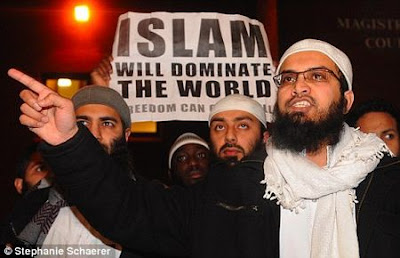This information needs to get to you, you need to read this, digest it, then look around again to understand what is going on, or what you;re standing on, or what you;re standing on.
The Abuja Declarion is the outcome of a conference of the African countries of the (OIC) in 1989 and launched by a communiqué of the Islam in Africa Organisation (IAO) founded during this conference. This communiqué conference was held in Abuja, Nigeria between 24 and 28 November 1989. The declaration was to the effect that Muslims should unite throughout Africa, various educational establishments, should conform to Muslim ideas, the education of women should be attended to, the teaching of Arabic should be encouraged, and Muslims should support economic relations with Islamic areas worldwide. It noted that Muslims in Africa had been deprived of rights to be governed under sharia law and they should strengthen their struggle to reinstate it.
their goal is to win the whole of Africa for Islam.With the Smoke screen of trying to promote the unity and solidarity of the Muslim ummah throughout Africa and the rest of the world and to support, and fight oppression especially in Africa and the world in general, to propagate the knowledge of Islam throughout the continent, To promote the dissemination of the knowledge of sharia and support its application to Muslim communities in Africa. To strive for the evolution of the economies of the ummah in conformity with the sharia and the attainment of economic self-sufficiency and self-reliance in Africa by promoting industrialization, trade and overall economic development. . To serve as a mouthpiece for the articulation of issues of common concern to Muslim communities in Africa and the rest of the world. To undertake research and publications on all aspects of Islamic history and Islamic intellectual heritage in Africa. To undertake the translation of Islamic works into various African languages and their dissemination.
there have been commentaries on the subject matter, John Chesworth (director of Islam and Christian-Muslim relations at St Paul's United Theological College, Limuru
, Kenya) and John Azumah (senior research fellow, Akrofi-Christaller Memorial Centre, Ghana) have reviewed the proceedings at the conference. On the decision to set up the IAO, Heather Deegan (senior lecturer in Comparative Politics, Middlesex University
) has commented "More recently Islam has adopted a liberating posture, presenting itself as a religion which will rest countries from their neocolonial dependencies and ignoring the fact that it too was a conquering and colonising force in Africa over the longue durée." The East African Centre for Law and Justice reports the declaration verbatim but goes on to quote two other objectives which it says were omitted from the IAO website.

In 1990 another declaration was publicized claiming to be from the 1989 conference and which Frans Wijsen (professor of World Christianity and Interreligious Relations at Radboud University Nijmegen) regards as a forgery because it does not correspond with declarations made at the conference. Regarding Africa, it said, amongst other things, that only Muslims should be appointed to strategic posts, non-Muslim religions should be eradicated, Nigeria should become a Federal Islamic Sultanate, and western law should be replaced with sharia. Wijsen regards this as indicating a more militant aspect of Islam in Africa and comments that some aspects directly conflict with official Islamic teaching
President Muhammadu Buhari on Thursday february 25 2016 welcomed an offer by the Islamic Development Bank to organise a financing round-table in Abuja to mobilise more funds for investment and development of infrastructure in Nigeria. According to a statement by his Senior Special Assistant on Media and Publicity, Garba Shehu, the President expressed his delight at the offer at a meeting he had with the IDB President, Dr. Ahmed Mohammed Ali, in Mecca, Saudi Arabia. Ali was said to have assured Buhari that the IDB will work with its traditional partners such as the Saudi Fund, the Kuwait Fund, Arab Bank for Development in Africa and the Abu Dhabi Fund, to increase the quantum of funding available to Nigeria.
Source: Wikipedia, the free encyclopedia




















